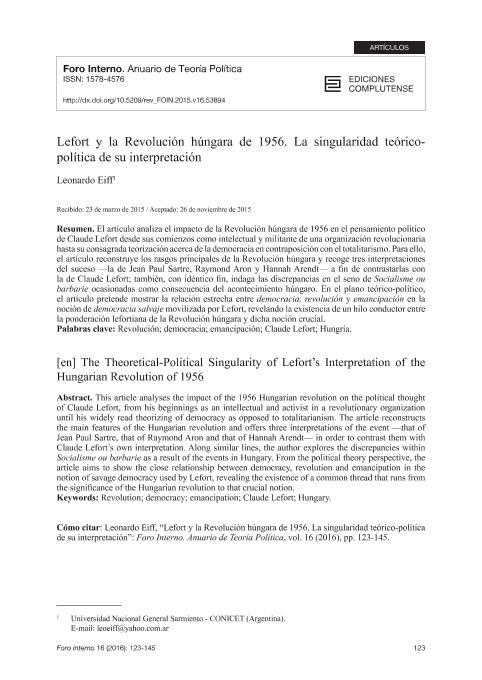Mostrar el registro sencillo del ítem
dc.contributor.author
Eiff, Leonardo Daniel

dc.date.available
2019-06-11T17:05:04Z
dc.date.issued
2016-12
dc.identifier.citation
Eiff, Leonardo Daniel; Lefort y la Revolución húngara de 1956: La singularidad teórico-política de su interpretación; Universidad Complutense de Madrid; Foro Interno; 16; 12-2016; 123-145
dc.identifier.issn
1578-4576
dc.identifier.uri
http://hdl.handle.net/11336/77952
dc.description.abstract
El artículo analiza el impacto de la Revolución húngara de 1956 en el pensamiento político de Claude Lefort desde sus comienzos como intelectual y militante de una organización revolucionaria hasta su consagrada teorización acerca de la democracia en contraposición con el totalitarismo. Para ello, el artículo reconstruye los rasgos principales de la Revolución húngara y recoge tres interpretaciones del suceso —la de Jean Paul Sartre, Raymond Aron y Hannah Arendt— a fin de contrastarlas con la de Claude Lefort; también, con idéntico fin, indaga las discrepancias en el seno de Socialisme ou barbarie ocasionadas como consecuencia del acontecimiento húngaro. En el plano teórico-político, el artículo pretende mostrar la relación estrecha entre democracia, revolución y emancipación en la noción de democracia salvaje movilizada por Lefort, revelando la existencia de un hilo conductor entre la ponderación lefortiana de la Revolución húngara y dicha noción crucial.
dc.description.abstract
This article analyses the impact of the 1956 Hungarian revolution on the political thought of Claude Lefort, from his beginnings as an intellectual and activist in a revolutionary organization until his widely read theorizing of democracy as opposed to totalitarianism. The article reconstructs the main features of the Hungarian revolution and offers three interpretations of the event —that of Jean Paul Sartre, that of Raymond Aron and that of Hannah Arendt— in order to contrast them with Claude Lefort’s own interpretation. Along similar lines, the author explores the discrepancies within Socialisme ou barbarie as a result of the events in Hungary. From the political theory perspective, the article aims to show the close relationship between democracy, revolution and emancipation in the notion of savage democracy used by Lefort, revealing the existence of a common thread that runs from the significance of the Hungarian revolution to that crucial notion.
dc.format
application/pdf
dc.language.iso
spa
dc.publisher
Universidad Complutense de Madrid

dc.rights
info:eu-repo/semantics/openAccess
dc.rights.uri
https://creativecommons.org/licenses/by/2.5/ar/
dc.subject
REVOLUCIÓN
dc.subject
DEMOCRACIA
dc.subject
MARXISMO
dc.subject
EMANCIPACIÓN
dc.subject.classification
Ciencia Política

dc.subject.classification
Ciencia Política

dc.subject.classification
CIENCIAS SOCIALES

dc.title
Lefort y la Revolución húngara de 1956: La singularidad teórico-política de su interpretación
dc.title
The Theoretical-Political Singularity of Lefort’s Interpretation of the Hungarian Revolution of 1956
dc.type
info:eu-repo/semantics/article
dc.type
info:ar-repo/semantics/artículo
dc.type
info:eu-repo/semantics/publishedVersion
dc.date.updated
2019-06-10T20:35:17Z
dc.identifier.eissn
1988-2920
dc.journal.volume
16
dc.journal.pagination
123-145
dc.journal.pais
España

dc.journal.ciudad
Madrid
dc.description.fil
Fil: Eiff, Leonardo Daniel. Consejo Nacional de Investigaciones Científicas y Técnicas; Argentina. Universidad Nacional de General Sarmiento; Argentina
dc.journal.title
Foro Interno
dc.relation.alternativeid
info:eu-repo/semantics/altIdentifier/doi/http://dx.doi.org/10.5209/rev_FOIN.2015.v16.53894
dc.relation.alternativeid
info:eu-repo/semantics/altIdentifier/url/https://revistas.ucm.es/index.php/FOIN/article/view/53894
Archivos asociados
